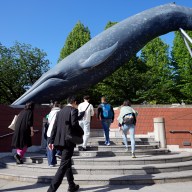True, there was the guy who lifted his pant leg to reveal red marks.
Bed bugs? he asked. Maybe, I reply, munching on a piece of aged gouda cheese. It’s intimacy like this you get at candidate house parties.
This one is in Edgemont for Ward 4 candidate Gael Macleod. There’s wine, cheese and friends from my book club. Macleod speaks, mingles. Her manager asks for money. Welcome to good old-fashioned campaigning.
Ward 4 has 11 candidates. Macleod’s strategy is house party, SuperStore meet and greets, and open houses.
I ask her campaign manager about Twitter. “Does anyone know if Twitter actually brings out votes?” she asks.
Ric McIver campaign manager Sam Armstrong wonders the same thing. He prefers house parties to Twitter and debates.
“You have an intimate environment with people predisposed to your candidate. They leave and there’s a ripple effect,” says Armstrong.
No candidate can match the Twitter king Naheed Nenshi.
But he’s house partying like crazy, too. Friday, the mayoral candidate was in Scarboro.
It’s a community that Nenshi has accused of BANANAs — Build Absolutely Nothing Anywhere Near (nenshi.ca/new/inclusive-zoning).
The host is a friend, and I bring another friend, an African immigrant, who works to raise money for grandmothers taking care of AIDS orphans. She wants to hear about social issues.
In front of the fireplace, Nenshi makes an articulate speech: Part policy, part jabs at his opponents.
Current city council? “Truly awful.” City auditor? She found cost overruns on every project she audited. Suburbs? It costs the city $10,000 per home in costs never recovered by taxes.
He wants an airport tunnel for the city’s third-largest employment area, and identifies a reserve fund that would pay for it.
He mocks the city’s idea of building an LRT adjacent to the airport, not to it.
Nenshi questions city council priorities: Two years spent discussing closing two lanes of Memorial Drive?
He fields an aggressive question about raising taxes. Nenshi won’t promise not to (“if any candidate tells you that, they’re lying”), and argues for an “adult conversation” about priorities.
At the end, my friend tells me she wants to invite Nenshi to her house for a party “not like this one.”
“With people I know,” she laughs. “And not to talk about taxes.”
Most of the electorate isn’t on Twitter. Our precious democracy begins, first, in conversation, at home.















